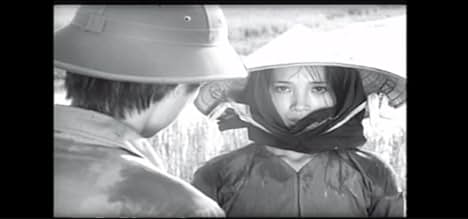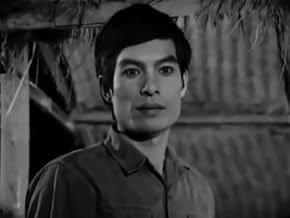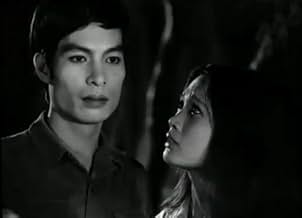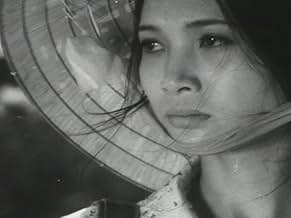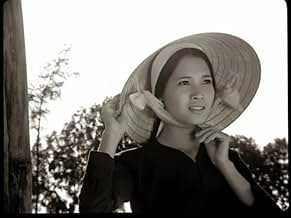NOTE IMDb
7,6/10
577
MA NOTE
Ajouter une intrigue dans votre langueDuyen faces a daily struggle to care for her young son and her weakened father-in-law, while keeping secret the fact that her husband died in a battle during the war.Duyen faces a daily struggle to care for her young son and her weakened father-in-law, while keeping secret the fact that her husband died in a battle during the war.Duyen faces a daily struggle to care for her young son and her weakened father-in-law, while keeping secret the fact that her husband died in a battle during the war.
- Récompenses
- 1 victoire et 2 nominations au total
Avis à la une
As simple it could be, the movie took my tears in the last scenes. Somehow I could feel the bitterness and the extreme heartbroken feeling when the father touched the soldier's gun whom he believed his son. To understand that faith has extreme power to heal, though illusive it had to be. Dang Nhat Minh described war with a sensible point of view. Father, mother, wife and kids are the most vulnerable when it comes to war. They suffer the pain, a kid became brave and a wife said white liar. The painting of the countryside of Vietnam was well described, with sincere farmers. Just listen to their conversations, they are REAL. I believe every Vietnamese have lived those dialogs, simple but nothing more than caring and faithful.
Beautifully shot, although I wish the copy on YT was in better quality, good plot, stunning lead actress, generally good performances. Duyen's plight feels real, her decision makes sense to her from what we see, Khang's predicament is believable and his decision realistic and heartfelt, and even Duyen's deceased husband is very genuine in the scenes he appears. Her little boy is also very natural.
However it suffers from a few scenes that overdramatize emotions, because they are glaring in the context of everything else that feels very authentic and even subtle.
I liked the singing part and I was surprised that Duyen could sing that well all of a sudden. That song was very emotionally charged and Khang watching her sing was a well thought-out scene. Also, the scenes at the ghost temple are very interesting, and I understand the censorship didn't like them very much so a lot had to be cut out. What remains is still interesting though. Communist China also censors stories about ghosts I think, I don't understand what they believe the danger is there.
Anyway, I believe the movie could have been much better without the excessive melodrama of a few scenes so I just couldn't rate it higher, but it is a powerful story told well so I understand the historical and cultural relevance of the movie, I just cannot love it as much as others do. The cinematography is beautiful and if it could have been restored the movie would look absolutely gorgeous.
However it suffers from a few scenes that overdramatize emotions, because they are glaring in the context of everything else that feels very authentic and even subtle.
I liked the singing part and I was surprised that Duyen could sing that well all of a sudden. That song was very emotionally charged and Khang watching her sing was a well thought-out scene. Also, the scenes at the ghost temple are very interesting, and I understand the censorship didn't like them very much so a lot had to be cut out. What remains is still interesting though. Communist China also censors stories about ghosts I think, I don't understand what they believe the danger is there.
Anyway, I believe the movie could have been much better without the excessive melodrama of a few scenes so I just couldn't rate it higher, but it is a powerful story told well so I understand the historical and cultural relevance of the movie, I just cannot love it as much as others do. The cinematography is beautiful and if it could have been restored the movie would look absolutely gorgeous.
Couldn't say anything more. This movie comes to the heart of any person who lived through the war especially those in the North of Viet Nam. The movie gives one of the best portrayal of the suffering, in particular, of those women who lost their husbands, and of the children who lost their fathers during the war. The suffering is deepened when a noble will is condemn by the society, and when those related to the story have to face conflicting emotions all the time. Le Van shows her best performance, as well as Dung Nhi (?) and The Anh. See the movie and you will understand more the lives of Northern Vietnamese during the War.
The legacy of the Vietnam war is described vividly from the real sufferers, not from Hollywood. The theme of this movie is somehow similar to the famous movies " Cranes are Flying" and " Ballad of Soldier" from the former Soviet Unions. Highly recommended.
"But why are you still alive?"
This is a war film, but it's one about the human cost to those waiting at home while loved ones go off to fight, not actual combat. In it, a young woman (Le Van) harbors a secret from her family - she knows that her husband was killed about a year ago. She keeps up the ruse by having a man she's met on a ferry write letters as if he were him, but eventually the two begin having feelings for one another. There is a fair dose of melodrama in the story set to soaring, emotional music, and it's effective at making one feel the national sorrow for millions over decades of brutal fighting. In the quote above, uttered by the innocent boy to a comrade of his dead father's, followed by the man's look of wild grief, the film also captures a sense of survivor's guilt in a deeply moving way.
Le Van is brilliant at conveying the angst of her situation and the profound isolation of keeping her secret. She's also wonderful in performing the cheo (a traditional Vietnamese theatrical opera) in the middle of the film, one which mirrored her character's life. In an earlier scene there is mention of the government selecting their village as one that will be involved with the "adoption movement for martyr families," meaning that if they've lost a son in war, another young man will "become their son" as a pragmatic replacement, a parallel to her possibly replacing her husband. Similarly, when her husband's comrade in arms appears at his father's deathbed and gives the old man comfort by pretending to be his son, we get the feeling of a desperate salve to lives lost, and people carrying on as best they can.
Throughout the film there is beautiful cinematography, completely in tune with the emotions of the people in this little village. The long shot of the new man trudging through a rice field, the young woman flying a kite he's made for her son on a hillside, and him taking the ferry across the river when the town begins to suspect a scandal are all fantastic. I also loved the bits of magical realism, like the meeting with the village god, or the market held near a temple held on (lunar) July 15, the traditional day of Tet Trung Nguyen (Ghost Festival), in the middle of the "ghost month," arranged so that living and dead can meet each other.
The film has its focus on those who suffered behind the scenes because of the war, not revolutionary propaganda as in other films, but unfortunately it can't help itself at the very end, when we see flags proudly flying, and the little boy going off to school. Maybe it was necessary as an uplift, an indication that life must go on for the people and the country after countless tragedies, but it felt a little off. Unfortunately, director Dang Nhat Minh had to run the gauntlet with the censors 13 times with this film, who were sensitive to love blossoming with the teacher and to the ghost sequence, and one wonders what this film would have looked like unfettered. Still, very well made, and packs a punch.
This is a war film, but it's one about the human cost to those waiting at home while loved ones go off to fight, not actual combat. In it, a young woman (Le Van) harbors a secret from her family - she knows that her husband was killed about a year ago. She keeps up the ruse by having a man she's met on a ferry write letters as if he were him, but eventually the two begin having feelings for one another. There is a fair dose of melodrama in the story set to soaring, emotional music, and it's effective at making one feel the national sorrow for millions over decades of brutal fighting. In the quote above, uttered by the innocent boy to a comrade of his dead father's, followed by the man's look of wild grief, the film also captures a sense of survivor's guilt in a deeply moving way.
Le Van is brilliant at conveying the angst of her situation and the profound isolation of keeping her secret. She's also wonderful in performing the cheo (a traditional Vietnamese theatrical opera) in the middle of the film, one which mirrored her character's life. In an earlier scene there is mention of the government selecting their village as one that will be involved with the "adoption movement for martyr families," meaning that if they've lost a son in war, another young man will "become their son" as a pragmatic replacement, a parallel to her possibly replacing her husband. Similarly, when her husband's comrade in arms appears at his father's deathbed and gives the old man comfort by pretending to be his son, we get the feeling of a desperate salve to lives lost, and people carrying on as best they can.
Throughout the film there is beautiful cinematography, completely in tune with the emotions of the people in this little village. The long shot of the new man trudging through a rice field, the young woman flying a kite he's made for her son on a hillside, and him taking the ferry across the river when the town begins to suspect a scandal are all fantastic. I also loved the bits of magical realism, like the meeting with the village god, or the market held near a temple held on (lunar) July 15, the traditional day of Tet Trung Nguyen (Ghost Festival), in the middle of the "ghost month," arranged so that living and dead can meet each other.
The film has its focus on those who suffered behind the scenes because of the war, not revolutionary propaganda as in other films, but unfortunately it can't help itself at the very end, when we see flags proudly flying, and the little boy going off to school. Maybe it was necessary as an uplift, an indication that life must go on for the people and the country after countless tragedies, but it felt a little off. Unfortunately, director Dang Nhat Minh had to run the gauntlet with the censors 13 times with this film, who were sensitive to love blossoming with the teacher and to the ghost sequence, and one wonders what this film would have looked like unfettered. Still, very well made, and packs a punch.
Meilleurs choix
Connectez-vous pour évaluer et suivre la liste de favoris afin de recevoir des recommandations personnalisées
Détails
- Date de sortie
- Pays d’origine
- Langue
- Aussi connu sous le nom de
- When the Tenth Month Comes
- Sociétés de production
- Voir plus de crédits d'entreprise sur IMDbPro
- Durée1 heure 25 minutes
- Couleur
- Mixage
Contribuer à cette page
Suggérer une modification ou ajouter du contenu manquant

Lacune principale
By what name was Quand viendra le mois d'octobre (1984) officially released in India in English?
Répondre
